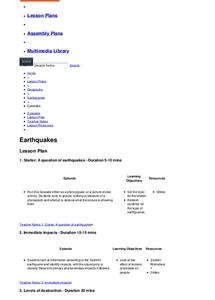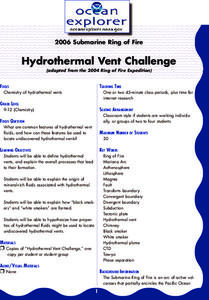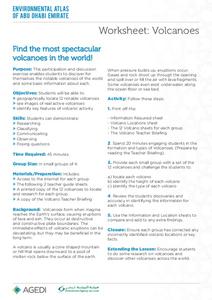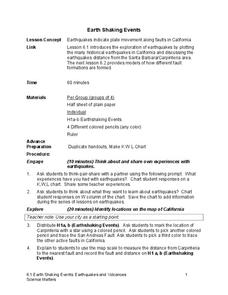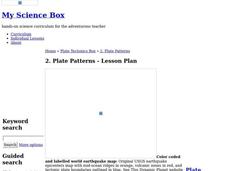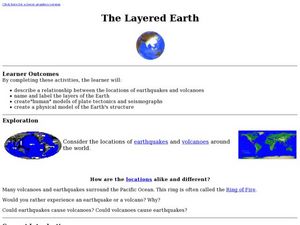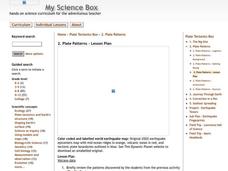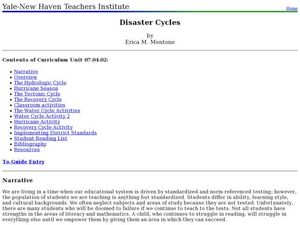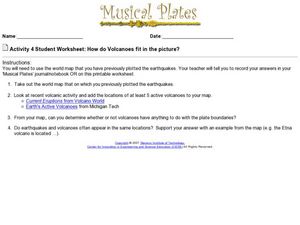Curated OER
Life of an Island: From Mountain to Atoll
Students research the evolution of a volcanic island from origin to erosion. They determine the relative ages of the Northwestern Hawaiian Islands given their position in the archipelago.
Curated OER
Earthquakes
Students take a closer look at earthquakes. In this earthquake lesson, students investigate the causes of Kashmir earthquake and the impact of the earthquake. Students also consider aid efforts in the aftermath of earthquakes.
Curated OER
Solid Earth Socratic Questions
Students participate in a whole class discussion to relate what they know about earthquakes to the processes of plate tectonics. They respond to prompts that lead them to conclusions about the layers of the earth.
Curated OER
Earthquakes- An Introduction
Sixth graders investigate the concepts related to creating an understanding of how earthquakes occur. They participate in a variety of activities that are tied to each other and focus upon the principle of plate tectonics. Then students...
Environment Agency - Abu Dhabi
Earthquakes
What causes earthquakes? What are the effects and impacts of earthquakes? How are earthquakes measured? If there was an earthquake on Mars, would it still be considered an earthquake? Class members will find the answers to these and many...
Curated OER
Hydrothermal Vent Challenge
Give our ocean voyagers the "Hydrothermal Vent Challenge!" It is a worksheet that guides them through an exploration of hydrothermal vents and the chemical reactions that occur when lava meets seawater. Using a collection of websites,...
Environment Agency - Abu Dhabi
Find the Most Spectacular Volcanoes in the World!
Heat things up in your earth science class with this collaborative lesson on volcanoes. After first being introduced to the different types of volcanoes and how they are formed, young geologists work in small groups to research the...
Science Matters
Earth Shaking Events
The world's largest measured earthquake happened in 1960 in Chile, reaching a terrifying 9.5 magnitude on the Richter Scale. The second lesson in the 20-part series introduces earthquakes and fault lines. Scholars map where previous...
Curated OER
Earthquake Machine
Young scholars explore plate tectonics by conducting a class experiment. In this earthquake lesson, students utilize scrap wood, sandpaper, rubber bands and a sanding belt to create a model earthquake experiment which shakes a nearby...
Curated OER
Life Along the Ring of Fire
Students research geological forces that create the Ring of Fire and its effects on cultures. They write reports on how natural disasters influence societies.
Curated OER
Plate Patterns
Students review the patterns they discovered from a previous activity. In this investigative lesson students plot data as a class and color a map.
Curated OER
The Layered Earth
Learners role play plate tectonics by creating a "plate statue" made up of students. In this earth science lesson, learners describe how Earth's movement cause earthquakes and volcanoes. They draw and name the different layers of the Earth.
Curated OER
Plate Patterns
Students read about a volcano and use the latitude and longitude information to plot and describe the volcano on the map. They discuss patterns seen on the map. In addition, they color code a map according to zones, plates, etc.
Curated OER
Disaster Cycles
Students explore what causes natural disasters. In this environmental lesson plan, students will spend four weeks using activities to help in their understanding of the Hydrological Cycle, Hurricanes, Plate Tectonics, and the Recovery...
Curated OER
How Does Your Magma Grow?
Students identify the three types of plate boundaries and the Earth's tectonic plates system. They examine how the Galapagos Islands were formed and hydrothermal vents.
Curated OER
Converging Earthquake!
Students identify the fault lines and tectonic plates on the map. In this earth science lesson plan, students simulate landscape formation using robots. They take a quiz at the end of the lesson plan to demonstrate mastery.
Curated OER
What's the Difference?
Students discover how volcanic processes differ at convergent and divergent tectonic plate boundaries. They identify three geologic features that are associated with most volcanoes on Earth.
Curated OER
Drifting Continents
Students, through teacher-led demonstration, explore the idea of continental drift. They complete a worksheet involving the calculation of continental drift over time.
Curated OER
Frogs Frogs Frogs
Young scholars view a disk on the continental movement and analyze the given data on fossils, rock types and climate zones. In this geology lesson plan students draw a diagram of the earths layers, take a quiz complete a PowerPoint...
Curated OER
Normal (dip-slip) Earthquake!
Students label the fault lines and tectonic plate boundaries on the world map. For this earth science lesson, students simulate ocean floor formation using CEENboTs. They explain the causes of earthquakes.
Curated OER
Continents Adrift
Students examine how tectonic plates change the Earth's land. In this geology lesson, students are divided into small groups to construct a continent puzzle. Students use transparency pieces to demonstrate how Africa and South America...
Curated OER
How do Volcanoes Fit in the Picture?
In this volcanoes worksheet, students look at maps and answer short answer questions about volcanoes, plate boundaries, and earthquakes. Students complete 4 questions.
Curated OER
Volcano!-Thar She Blows!
Young scholars describe how volcanoes are formed. They name the types of boundaries where volcanoes occur. They utilize models to illustrate the occurence of volcanoes and earthquakes along plate boundaries. They compare and constrast...
Curated OER
Formation of Volcanoes
Ninth graders explore the process of different volcanoes and how plate tectonics plays a role. In this volcanic activity students complete several assignments on plate tectonics.



